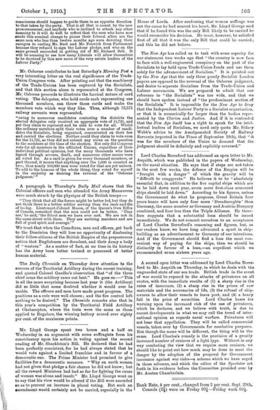A second open letter was addressed by Lord Charles Beres-
ford to Mr. Asquith on Thursday, in which he deals with the
unguarded state of our sea trade. British trade in the event of war would be exposed to the attacks of privateers on all routes, with the immediate results of (1) a sharp rise in the rates of insurance, (2) a sharp rise in the prices of raw materials and the necessaries of life, (3) the refusal of ship- owners to allow their vessels to leave port, and (4) a heavy fall in the price of securities. Lord Charles bases his warning upon the increased risk of the use of privateers, which he declares, and we believe with truth, is due to recent developments in what we may call the trend of inter- national opinion as regards naval warfare. Privateers will not bear that appellation. They will be called commercial vessels, taken over by Governments for combative purposes. But though the name will be different, the thing will be the same. Lord Charles's remedy is the provision of a greatly increased number of cruisers of a light type. Without in any way combating the view that we require more cruisers, we should like to point out how much may be done to meet the danger by the adoption of the proposal for Government insurance against war risks—a scheme which we have urged in these columns, and which the editor of the Spectator set forth in his evidence before the Committee presided over by Mr. Austen Chamberlain.


























































 Previous page
Previous page